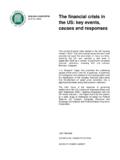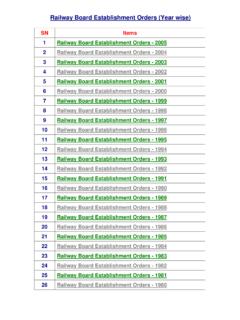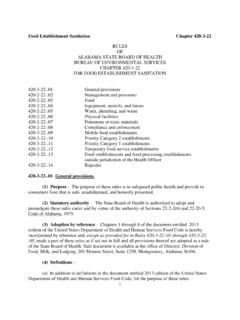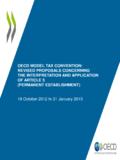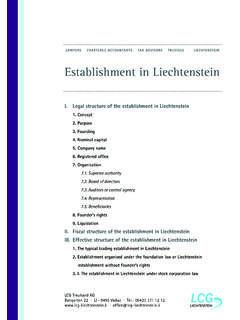Transcription of The Anglo-American Establishment - Voltaire Net
1 The Anglo-American Establishment By Carroll Quigley Professor of Foreign Service Georgetown University New York: Books in Focus 1981 Table of Contents Chapter 1 Introduction Chapter 2 The Cecil Bloc Chapter 3 The Secret Society of Cecil Rhodes (1) Chapter 4 Milner s Kindergarten, 1897-1910 Chapter 5 Milner Group, Rhodes, and Oxford, 1901-1925 Chapter 6 The Times Chapter 7 The Round Table Chapter 8 War and Peace, 1915-1920 Chapter 9 Creation of the Commonwealth Chapter 10 The Royal Institute of International Affairs Chapter 11 India, 1911-1945 Chapter 12 Foreign Policy, 1919-1940 Chapter 13 The Second World War, 1939-1945 Appendix A Tentative Roster of the Milner Group Notes Preface The Rhodes Scholarships, established by the terms of Cecil Rhodes's seventh will, are known to everyone.
2 What is not so widely known is that Rhodes in five previous wills left his fortune to form a secret society, which was to devote itself to the preservation and expansion of the British Empire. And what does not seem to be known to anyone is that this secret society was created by Rhodes and his principal trustee, Lord Milner, and continues to exist to this day. To be sure, this secret society is not a childish thing like the Ku Klux Klan, and it does not have any secret robes, secret handclasps, or secret passwords. It does not need any of these, since its members know each other intimately.
3 It probably has no oaths of secrecy nor any formal procedure of initiation. It does, however, exist and holds secret meetings, over which the senior member present presides. At various times since 1891, these meetings have been presided over by Rhodes, Lord Milner, Lord Selborne, Sir Patrick Duncan, Field Marshal Jan Smuts, Lord Lothian, and Lord Brand. They have been held in all the British Dominions, starting in South Africa about 1903; in various places in London, chiefly 175 Piccadilly; at various colleges at Oxford, chiefly All Souls; and at many English country houses such as Tring Park, Blickling Hall, Cliveden, and others.
4 This society has been known at various times as Milner's Kindergarten, as the Round Table Group, as the Rhodes crowd, as The Times crowd, as the All Souls group, and as the Cliveden set. All of these terms are unsatisfactory, for one reason or another, and I have chosen to call it the Milner Group. Those persons who have used the other terms, or heard them used, have not generally been aware that all these various terms referred to the same Group. It is not easy for an outsider to write the history of a secret group of this kind, but, since no insider is going to do it, an outsider must attempt it.
5 It should be done, for this Group is, as I shall show, one of the most important historical facts of the twentieth century. Indeed, the Group is of such significance that evidence of its existence is not hard to find, if one knows where to look. This evidence I have sought to point out without overly burdening this volume with footnotes and bibliographical references. While such evidences of scholarship are kept at a minimum, I believe I have given the source of every fact which I mention. Some of these facts came to me from sources which I am not permitted to name, and I have mentioned them only where I can produce documentary evidence available to everyone.
6 Nevertheless, it would have been very difficult to write this book if I had not received a certain amount of assistance of a personal nature from persons close to the Group. For obvious reasons, I cannot reveal the names of such persons, so I have not made reference to any information derived from them unless it was information readily available from other sources. Naturally, it is not possible for an outsider to write about a secret group without falling into errors. There are undoubtedly errors in what follows. I have tried to keep these at a minimum by keeping the interpretation at a minimum and allowing the facts to speak for themselves.
7 This will serve as an excuse for the somewhat excessive use of quotations. I feel that there is no doubt at all about my general interpretation. I also feel that there are few misstatements of fact, except in one most difficult matter. This difficulty arises from the problem of knowing just who is and who is not a member of the Group. Since membership may not be a formal matter but based rather on frequent social association, and since the frequency of such association varies from time to time and from person to person, it is not always easy to say who is in the Group and who is not.
8 I have tried to solve this difficulty by dividing the Group into two concentric circles: an inner core of intimate associates, who unquestionably knew that they were members of a group devoted to a common purpose; and an outer circle of a larger number, on whom the inner circle acted by personal persuasion, patronage distribution, and social pressure. It is probable that most members of the outer circle were not conscious that they were being used by a secret society. More likely they knew it, but, English fashion, felt it discreet to ask no questions. The ability of Englishmen of this class and background to leave the obvious unstated, except perhaps in obituaries, is puzzling and sometimes irritating to an outsider.
9 In general, I have undoubtedly made mistakes in my lists of members, but the mistakes, such as they are, are to be found rather in my attribution of any particular person to the outer circle instead of the inner core, rather than in my connecting him to the Group at all. In general, I have attributed no one to the inner core for whom I do not have evidence, convincing to me, that he attended the secret meetings of the Group. As a result, several persons whom I place in the outer circle, such as Lord Halifax, should probably be placed in the inner core. I should say a few words about my general attitude toward this subject.
10 I approached the subject as a historian. This attitude I have kept. I have tried to describe or to analyze, not to praise or to condemn. I hope that in the book itself this attitude is maintained. Of course I have an attitude, and it would be only fair to state it here. In general, I agree with the goals and aims of the Milner Group. I feel that the British way of life and the British Commonwealth of Nations are among the great achievements of all history. I feel that the destruction of either of them would be a terrible disaster to mankind. I feel that the withdrawal of Ireland, of Burma, of India, or of Palestine from the Commonwealth is regrettable and attributable to the fact that the persons in control of these areas failed to absorb the British way of life while they were parts of the Commonwealth.
